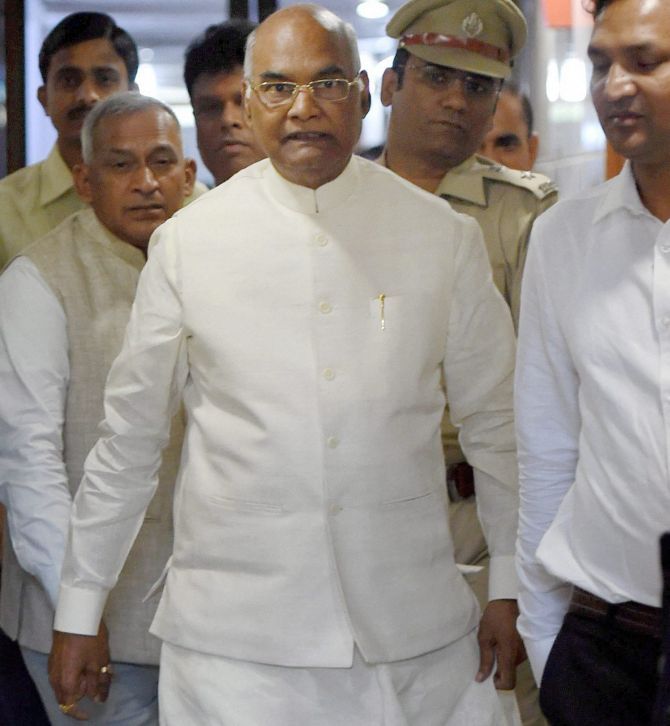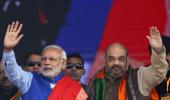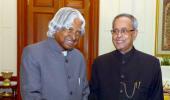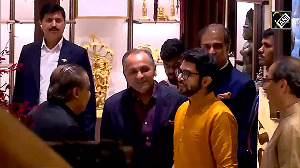'In a party run by 'two-and-a half men', Kovind fits the bill perfectly because, unlike the BJP's previous choice for the Presidency, A P J Abdul Kalam, he is unlikely to return a bill as Kalam did with the office of profit legislation,' argues Amulya Ganguli.

Will the new President, Ram Nath Kovind, who is certain to be elected, join the list of his predecessors who bowed and scraped before the prime minister?
Among them was Giani Zail Singh, who famously said that he was ready to sweep the floor if his leader, Indira Gandhi, asked him to do it.
And, then, there was Fakhruddin Ali Ahmed, who infamously signed on the dotted line to ring down the curtains on Indian democracy -- mercifully for no more than 21 months -- without asking then prime minister Indira Gandhi whether the proclamation for declaring an Emergency had Cabinet approval.
It may be unfair to place Kovind in their category without giving him a chance.
But what is clear is that the BJP -- or, rather, Narendra Modi -- chose him not because of his leadership potential, but just the opposite, as his low profile indicates.
A man from a modest background -- he holds a bachelor's degree in commerce and an LLB degree -- he is the quintessential common man.
Kovind did pass the IAS examination at the third attempt, but did not become part of the bamboo frame for he was selected for an allied service.
Instead, he decided to practise law, and became one among a host of black-robed practitioners in the Delhi high court and Supreme Court.
It is his low-key persona, however, which has stood him in good stead.
He may have been just the person Modi was looking for unlike, say, the internationally acclaimed geneticist M S Swaminathan, who was the Shiv Sena's second choice after RSS chief Mohan Bhagwat turned down the proposal for moving from Nagpur to the heart of Lutyens's Delhi.
Where someone like Dr Swaminathan or Sushma Swaraj or Gopalkrishna Gandhi would have drawn attention to themselves because of their achievements or lineage, Kovind will not automatically become the cynosure of all eyes.
In a party run by 'two-and-a half men' -- presumably Modi and Amit Shah with either Arun Jaitley or Rajnath Singh standing for the 'half' -- as the BJP apostate Arun Shourie has said, Kovind fits the bill perfectly because, unlike the BJP's previous choice for the Presidency, A P J Abdul Kalam, he is unlikely to return a bill as Kalam did with the office of profit legislation.
Kovind's quiet demeanour also marks him out as far more non-controversial than Tripura Governor Tathagata Roy of the BJP, who not infrequently hits the headlines with views such as that those who attended Yakub Memon's funeral should be kept under surveillance for being potential terrorists or quoting Syama Prasad Mookerjee's prediction of a civil war between Hindus and Muslims.
Not surprisingly, Kovind was deemed an 'ideal' governor by Bihar Chief Minister Nitish Kumar unlike Puducherry's Lieutenant Governor Kiran Bedi of the BJP, who is forever engaged in wrangles with the Union Territory's Congress Chief Minister V Narayanswamy.
Nitish Kumar's opinion of Kovind is in tune with the Constitutional convention that the governor, like children, should be seen and not heard.
By extension, the practice applies to the President as well.
Any views which the governor or the President may have are strictly personal and should not be expressed in public although s/he may convey them in private to the chief minister or the prime minister.
Time will show whether Kovind will have the reason to transmit any contrarian views to Modi. But, as of now, it doesn't seem likely because of the prospective President's RSS background.
In this context, his Dalit background is of secondary importance because it is unlikely to make the Dalits embrace the Rajputs in Saharanpur or forgive those who attacked them in Una, Gujarat, or pardon the Akhil Bharatiya Vidyarthi Parishad, Smriti Irani and Bandaru Dattatreya for Rohith Vemula's suicide.
If tokenism of this nature was of any value, then the presence of Ram Vilas Paswan, Thawar Chand Gehlot and Ramdas Athawale in the Union ministry would have acted as a soothing balm for the Dalits.
All that Kovind's selection has done is to throw a spanner in the Opposition's works by making it nearly impossible for Mayawati and Co to oppose his candidature unless the Congress decides to field Meira Kumar as the sacrificial lamb.
For Modi, therefore, it is a win-win situation, for he has set the saffron cat among the Opposition pigeons and placed a man he can implicitly trust in Rashtrapati Bhavan, which could not be said of, say, Sushma Swaraj with her earlier links with the L K Advani camp.
Amulya Ganguli writes on current affairs.
IMAGE: Bihar Governor Ram Nath Kovind -- the National Democratic Alliance candidate for the Presidency -- arrives at Bihar Niwas in New Delhi, June 20, 2017.










